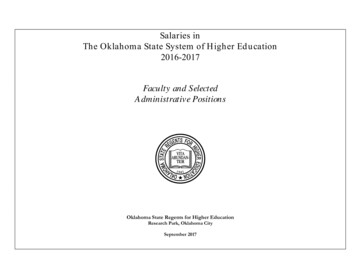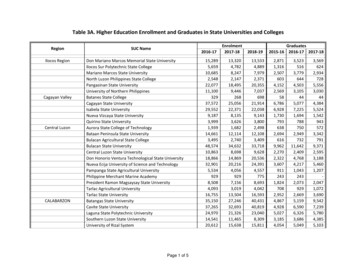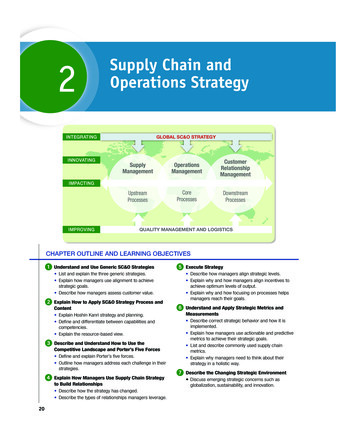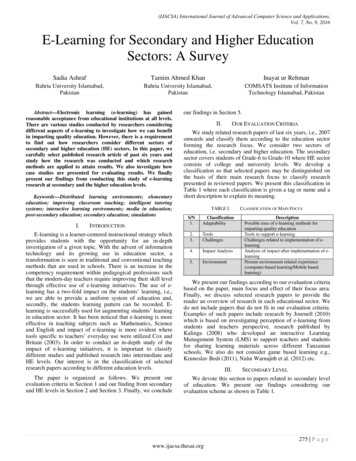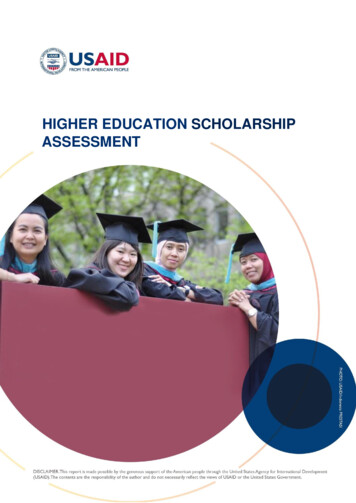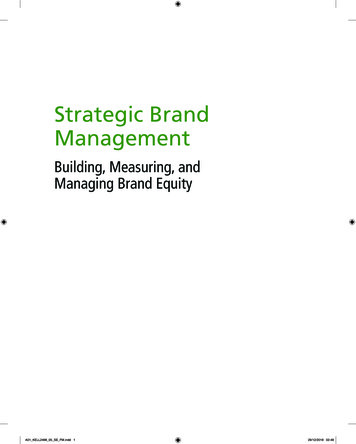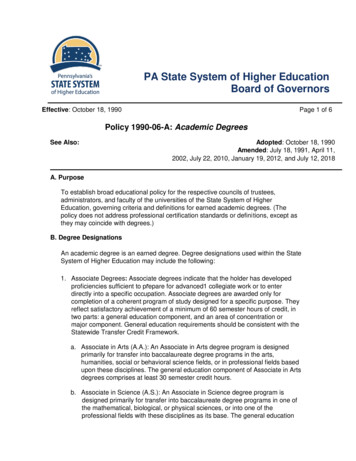
Transcription
PA State System of Higher EducationBoard of GovernorsEffective: October 18, 1990Page 1 of 6Policy 1990-06-A: Academic DegreesSee Also:Adopted: October 18, 1990Amended: July 18, 1991, April 11,2002, July 22, 2010, January 19, 2012, and July 12, 2018A. PurposeTo establish broad educational policy for the respective councils of trustees,administrators, and faculty of the universities of the State System of HigherEducation, governing criteria and definitions for earned academic degrees. (Thepolicy does not address professional certification standards or definitions, except asthey may coincide with degrees.)B. Degree DesignationsAn academic degree is an earned degree. Degree designations used within the StateSystem of Higher Education may include the following:1. Associate Degrees: Associate degrees indicate that the holder has developedproficiencies sufficient to prepare for advanced1 collegiate work or to enterdirectly into a specific occupation. Associate degrees are awarded only forcompletion of a coherent program of study designed for a specific purpose. Theyreflect satisfactory achievement of a minimum of 60 semester hours of credit, intwo parts: a general education component, and an area of concentration ormajor component. General education requirements should be consistent with theStatewide Transfer Credit Framework.a. Associate in Arts (A.A.): An Associate in Arts degree program is designedprimarily for transfer into baccalaureate degree programs in the arts,humanities, social or behavioral science fields, or in professional fields basedupon these disciplines. The general education component of Associate in Artsdegrees comprises at least 30 semester credit hours.b. Associate in Science (A.S.): An Associate in Science degree program isdesigned primarily for transfer into baccalaureate degree programs in one ofthe mathematical, biological, or physical sciences, or into one of theprofessional fields with these disciplines as its base. The general education
Policy 1990-06-A: Academic DegreesPage 2 of 6component for Associate in Science degrees comprises no less than 24semester credit hours.c.Associate in Applied Science (A.A.S.): An Associate in Applied ScienceDegree program is primarily designed to prepare students for immediateemployment or career entry. The general education component forAssociate in Applied Science degrees includes no less than 21 semestercredit hours.d. Other Associate Degrees: Specialized associate degrees may beauthorized within certain professions; some are career entry, and otherslead to transfer. Examples include the Associate in Science of Nursing(A.S.N.), and Associate in Engineering Technology (A.E.T.). The generaleducation component for these degrees should include no less than 21semester credit hours.2. Baccalaureate Degrees: Baccalaureate degrees require 120 semester credithours unless (1) otherwise required by statute, regulation, or accreditation, and(2) approval by the chancellor. Baccalaureate degrees consist of two principalcomponents, general education and study in depth in a major, which takentogether, are designed to prepare the student for a productive career, involvedcitizenship, and continuous growth:a. General education consists of a broad program of study in the liberal arts andsciences, such that at least 40 semester credit hours are focused oncompetencies consistent with the liberal education learning outcomes asdefined in Policy 1993-01: General Education at State System of HigherEducation Universities. These competencies are typically met through study inthe areas of humanities, fine arts, communication, social and behavioralsciences, mathematics, and the natural/physical sciences. In addition, generaleducation requirements should be consistent with distribution requirements ofthe statewide Transfer Credit Framework. Transfer credits up to 30 semesterhours will be applied to the general education requirement assuming thecourses meet the standards of the Transfer Credit Framework and aredesignated as equivalent through identification of comparable competenciesattained by students. Certain majors have specific requirements prescribed byexternal agencies that may pertain to general education requirements.b. The program for the major consists of at least 30 semester credit hours andprovides depth of knowledge in an academic disciplinary or interdisciplinaryprogram.c. The remainder of the curriculum may consist of coursework related to themajor, advanced coursework (see endnote) in the liberal arts and sciences, orelectives. At least 42 semester credit hours must consist of advancedcoursework.
Policy 1990-06-A: Academic DegreesPage 3 of 6Note: Definitions of advanced coursework are institutional, and may or may notbe inherent in course numbers. The object is to ensure that a significant portionof a student’s studies prepare the student to develop advanced competenciesrequiring depth of knowledge of the discipline. During program review, theprogram unit is expected to review its curriculum against this general standard.Programs that have articulation agreements with community colleges or otherentities must demonstrate that articulated courses approved to meet thisstandard address the acquisition of advanced competencies with adequatedepth and academic rigor; and if so, these courses can be applied toward thisrequirement.(1.) Bachelor of Arts (B.A.): The Bachelor of Arts degree is the common degree inthe arts and humanities, typically offered through the liberal arts andsciences. Bachelor of Arts degrees emphasize breadth and depth of study,and encourage aesthetic,ethical, and intercultural inquiry. The major program should not exceed 42semester credit hours, including required cognate courses, unless approved bythe chancellor. Cognate courses are those courses in related disciplinesrequired for the major. For example, a major in sociology might require acognate course in social psychology taught through Psychology.(2.) Bachelor of Science (B.S.): The Bachelor of Science degree is the commondegree in mathematics, the natural sciences, and many of the behavioral andsocial sciences. The Bachelor of Science degree generally represents a morestructured major program, and more direct orientation toward professionalpreparation than the Bachelor of Arts degree. The courses required by themajor, including required cognate courses in related disciplines, mustcomprise at least 40 semester credit hours but no more than 60 semestercredit hours, unless approved by the chancellor. Cognate courses are thosecourses in related disciplines required for the major. For example, a major inbiology might require a cognate course in biochemistry taught throughChemistry.(3.) Professional Baccalaureate Degrees: Professional degrees may be approvedand granted in certain professional fields, and may reflect standards ofprofessional societies or accrediting agencies as well as requirements of theuniversity. The general education component may be specifically adapted tothe profession, but must be consistent with the competencies appropriate forall students at the institution.Only a limited number of professional baccalaureate degrees will be recognized.These include Bachelor of Fine Arts (B.F.A.), Bachelor of Music (B.Mus. or B.M.),Bachelor of Science in Nursing (B.S.N.), Bachelor of Social Work (B.S.W.), Bachelorof Science in Business Administration (B.S.B.A) and the Bachelor of Science inEducation (B.S.Ed.). No other degree designations may be used unless approved bythe chancellor.
Policy 1990-06-A: Academic DegreesPage 4 of 63.Master’s Degrees: Master’s degrees represent advanced study beyond thebaccalaureate degree and signify mastery in a discipline or professional field. Amaster’s program requires a minimum of 30 semester credit hours and usuallyincludes three basic components: (a) a common core of courses related to thediscipline or field of study; (b) a concentration or specialization in a focused areaof the discipline; and (c) cognate courses which broaden perspective ormastery, or provide special skills such as statistics or foreign language. Master’sdegree programs will also be required to demonstrate that all students haveparticipated in a culminating experience. This requirement may be met througha thesis, research project, or comprehensive examination, or in some cases thisrequirement can be met through integrative experiences, such as practica,internships, and other field work that synthesize theory and practice. At least 50percent of coursework (excluding thesis, research or internship hours) tocomplete a master’s degree must be identified as primarily directed at graduatestudents with the majority of students in the course obtaining graduate credits.Master’s degrees include:Master of Arts (M.A.)Master of Liberal Arts (M.L.A.)Master of Science (M.S.)Master of Business Administration (M.B.A.)Master of Fine Arts (M.F.A.)Master of Physical Therapy (M.P.T.)Master of Public Administration (M.P.A.)Master of Science in Library Science (M.S.L.S.)Master of Science in Nursing (M.S.N.)Master of Social Work (M.S.W.)Professional Science Masters (P.S.M.)Master of Education (M.Ed.), or Master of Science in Education (M.S.Ed.)The Master of Education (M.Ed.) degree is intended for the person who has beenworking within the preK-12 environment and desires to acquire advanced orupdated knowledge within the discipline, human development, assessment and/orpedagogy.Master of Arts in Teaching (M.A.T.)The Master of Arts in Teaching (M.A.T.) degree is intended for the person withexpertise in a discipline (e.g., chemistry or history or music) who needs to developthe skills and strategies to convey an understanding of the discipline to childrenand adolescents within the preK-12 context.4. Educational Specialist (Ed.S.): The Educational Specialist degree is intended forthe person who requires advanced knowledge of research and practice inselected specialty fields in education and such programs are grounded inextensive field work to develop the appropriate level of clinical practice. Theeducational specialist degree provides focused study beyond the master’s leveland is designed to develop skills in special areas of professional practice. Forcertain areas it may be considered a terminal professional practice degree and
Policy 1990-06-A: Academic DegreesPage 5 of 6not all Ed.S. coursework is compatible with doctoral study. As this degreetypically represents advanced study, all of the coursework should be designedfor graduate students with backgrounds in related areas of study.5. Doctoral Degrees: The doctorate is the highest academic degree awarded inAmerican higher education and is of two general types: the Doctor of Philosophy(Ph.D.) and the Professional Doctorate. Though the primary distinction is that thePh.D. is a research degree and professional degrees are applied degrees, mostdoctoral programs include both research and applied studies. The doctoralprogram usually follows completion of a master’s degree, except in some fieldswhere admission after the baccalaureate degree is permitted or encouraged. Thecommon components of a doctoral program include a core of increasinglyadvanced subject-area studies, culminating in seminars involving research.Research skills necessary for such studies, e.g., foreign languages, statistics, orcomputing, and/or internships or practica in applied fields should be required.Culminating experiences such as comprehensive examinations and adissertation are required.The Doctor of Philosophy is offered only through Indiana University of Pennsylvania(IUP); jointly in cooperation with IUP; or jointly with another institution approved tooffer Ph.D. degrees assuming approval by the chancellor. The number of hoursbeyond the baccalaureate degree (including dissertation hours) required for theDoctor of Philosophy degree must meet the typical expectations of the disciplineunless approved by the chancellor.C. ImplementationAll new degree programs submitted for approval after August 10, 2010, must complywith the above definitions, and all previously approved programs must be in suchcompliance by conclusion of the next program review cycle after July 1, 2012, with allprograms in compliance by August 1, 2015. The chancellor has the responsibility totake action to ensure compliance with this document.
Policy 1990-06-A: Academic DegreesPage 6 of 61 Advanced coursework in this context usually refers to courses with advanced depth ofcontent knowledge in the field and carry the expectation of more complexcompetencies identified in the expected student learning outcomes. These coursesoften have prerequisites and are usually beyond the “Introduction to ” level. Mostcourses with at least two prerequisites will be “advanced.” The complexity ofcompetencies is often reflected in the higher levels of understanding, analysis,synthesis and application of content to novel situations (see various models rooted inconcepts similar to Bloom’s taxonomy). Thus, whereas an introductory orfoundational knowledge course might use learning outcomes framed as “demonstratefamiliarity with” or “demonstrate knowledge of”; advanced level courses might use:“demonstrate ability to critically analyze and synthesize” or “ability to apply contentknowledge to novel situations.” Some disciplines use the model of three levels of“introductory,”“intermediate” and “advanced.” In this case, courses labeled as “intermediate” as asecond of a two course sequence providing basic or foundational content knowledgein a discipline would likely not meet the definition of “advanced” as used here but thatis to be determined on a course by course basis.
Statewide Transfer Credit Framework. a. Associate in Arts (A.A.): An Associate in Arts degree program is designed primarily for transfer into baccalaureate degree programs in the arts, humanities, social or behavioral science fields, or in professional fields based upon these discipli
